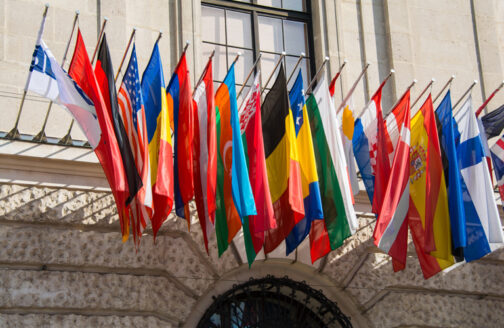Build it and they will come
 Credit: Adobe Stock/Elnur
Credit: Adobe Stock/Elnur Sustainable security is found not in isolation, but in cooperation
As I prepare to return to Munich almost a year after Russia’s full-scale invasion of Ukraine, I know that much of what we will discuss at this year’s Security Conference will revolve around how the foundations of the rules-based European security order have been shaken by this awful war.
We will talk about how to bring an end to the violence, and I will share what the Organization for Security and Co-operation in Europe (OSCE) is doing to provide support to Ukraine and to others confronted with the effects of the war. There will be discussions on how to ensure accountability.
We will also talk about other challenges to security that affect us all, including climate change, corruption and cybercrime. In all of these, the OSCE has a key role to play.
Since 1975, the OSCE has stood for shared security and multilateral cooperation. We have platforms for dialogue, tools for transparency and mechanisms for building confidence. Russia’s war against Ukraine has prompted a reassessment of Europe’s security architecture. We now stand at an inflection point. What we do here, at this moment, will impact our shared security for decades to come.
Some are questioning the merits of multilateralism. While there were many efforts made to prevent the war against Ukraine – including the offer of a renewed European security dialogue through the OSCE – Russia chose force. This reality does not, however, invalidate the successes of multilateral cooperation or the importance of platforms for dialogue, cooperation and accountability. It is important to preserve these platforms and maintain the tools that facilitate multilateral action, particularly in the face of fundamental violations of international norms.
One such tool at the OSCE’s disposal is the Moscow Mechanism, an instrument that allows countries to call for a mission of independent experts to investigate a problem relating to human rights and/or similar issues. Last year, 45 OSCE participating states joined in activating the Moscow Mechanism in early March and again in June to investigate violations and abuses committed in the context of the war against Ukraine.
Separately, after the OSCE was forced to close our two missions in Ukraine, we launched a multi-million-euro support program – a wholly donor-funded effort – to assist the government, civil society and the people of Ukraine. Our now nearly 60-person team in Kyiv is working on more than 20 projects to address issues including the impact of landmines, the environmental effects of the war, human trafficking and more. This program marks a new and innovative way of working. It also sends a clear message to any sceptics that potential obstacles will not stop us. The OSCE continues to deliver.
I am very much aware of the effects this war is having on other countries as well. Moldova is particularly impacted, and yet they continue to host so many of the women and children who have fled the violence in Ukraine. The OSCE Mission to Moldova is supporting government and civil society alike as they cope with the impacts of the war as well as a range of other challenges facing the country. One of the unique areas in which the OSCE provides support is in facilitating contacts between Chisinau and Tiraspol.
We are also in Central Asia, helping countries improve border security and cope with instability resulting from the Taliban takeover of Afghanistan. This includes analyses of the energy trade and potential risks to power supplies – the results of which will help Central Asian states develop mitigation strategies and contingency plans to ensure basic energy supplies for critical civilian infrastructure such as hospitals.
In South East Europe, our close collaboration with governments and civil society has been helping to strengthen regional cooperation on issues such as climate challenges and to engage youth toward a more stable and prosperous future. In particular, our work in the Shar/Sara Mountains area provides one of the first examples of joint solutions to climate and biodiversity crises through a security lens.
We have brokered agreements on measures to address a wide range of emerging threats, such as groundbreaking confidence-building measures that reduce the risks of conflict between countries stemming from the use of information and communication technologies.
We are working with governments, tech companies and civil society to harness the positive power of technology to combat human trafficking. One such initiative that we have undertaken with Thomson Reuters, the Be Safe campaign, provides information for Ukrainians who might be vulnerable to trafficking as well as guidance on how to spot warning signs, how to minimize risks and how to get help if needed.
For decades, the OSCE has partnered with governments and civil society to strengthen the foundations for secure and prosperous societies. We are providing support and expertise across the OSCE region on a range of security challenges – to catalyze reforms, improve policing, counter terrorism, address climate change, uphold democratic processes and human rights, engage young people and so much more.
In all aspects of our work, we strive to include underrepresented groups, such as women, youth and minorities in consultations and at the decision-making table. Only through inclusive approaches can we achieve security for all.
This is multilateralism in action. It reflects the fact that sustainable security is not found in isolation, but in cooperation. However, we are faced with the question of how we can effectively engage when there is a deficit of trust – and even outright conflict. Our security architecture must be capable of generating coordinated approaches to effectively address transnational and global challenges.
In the OSCE, our cooperation is based on a broad membership, a comprehensive approach and a powerful set of principles and commitments agreed to voluntarily by our participating states. They remain a foundation for security and stability in Europe. Enshrined in the OSCE’s tools and mechanisms, these values and principles clearly define how countries should treat one another and those who live in their territories. While recent violations of these commitments have done grave harm, they have also underscored how important it is to have a common set of rules we can all live by. These commitments are crucial to peace and accountability not only within the OSCE, but also the wider international community.
When foreign ministers gathered in Poland in December 2022 for the annual OSCE Ministerial Council, they reaffirmed the importance of these commitments, and of the Helsinki Principles on which the OSCE was founded. They made clear that in the face of violence and devastation, we should not abandon our principles or the tools we have built to support them, but rather use them in new and innovative ways. This is the work the OSCE is doing every day.
Helga Maria Schmid is General Secretary of the OSCE.


